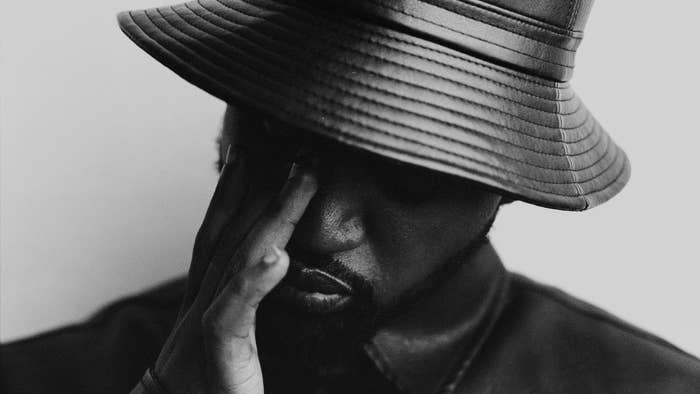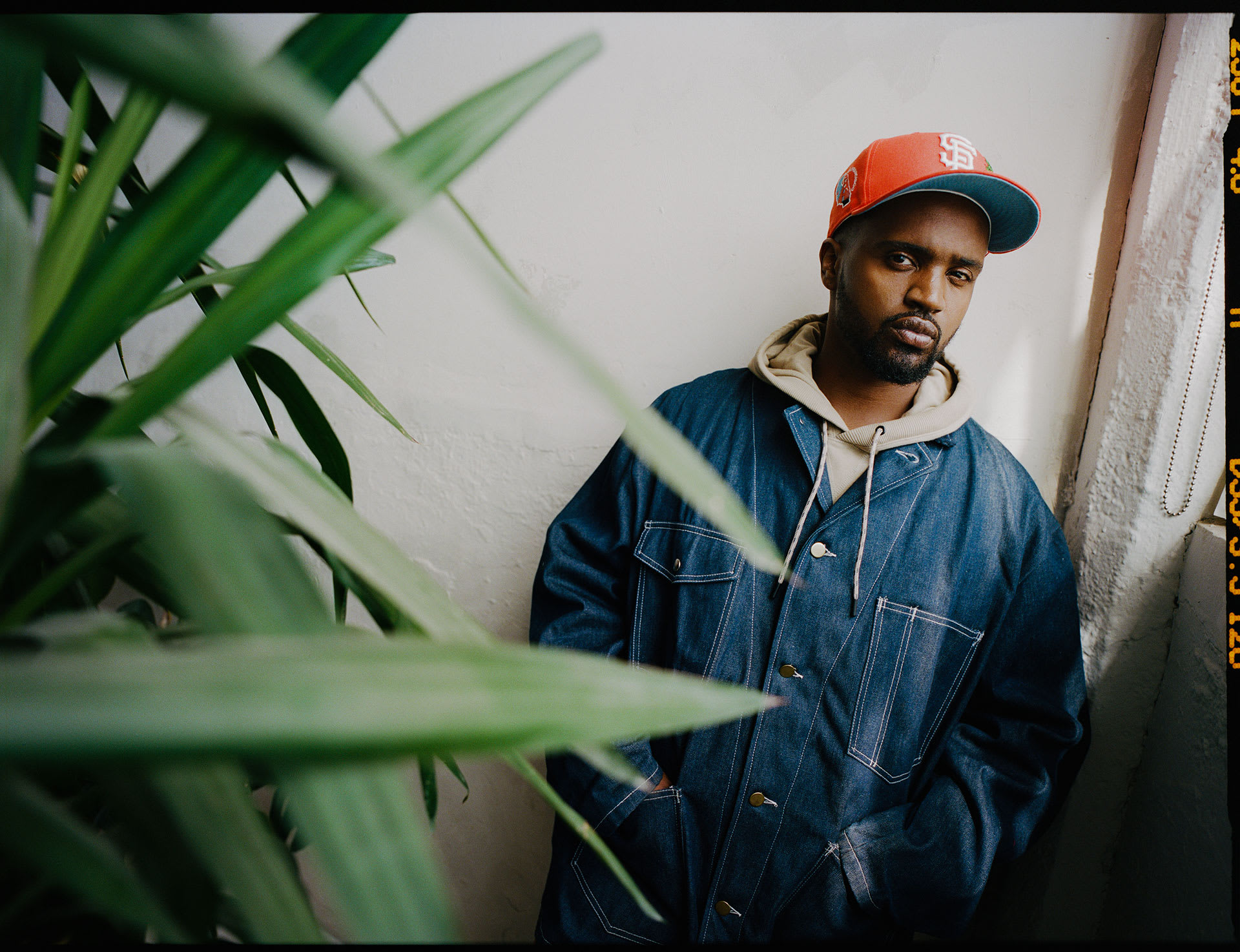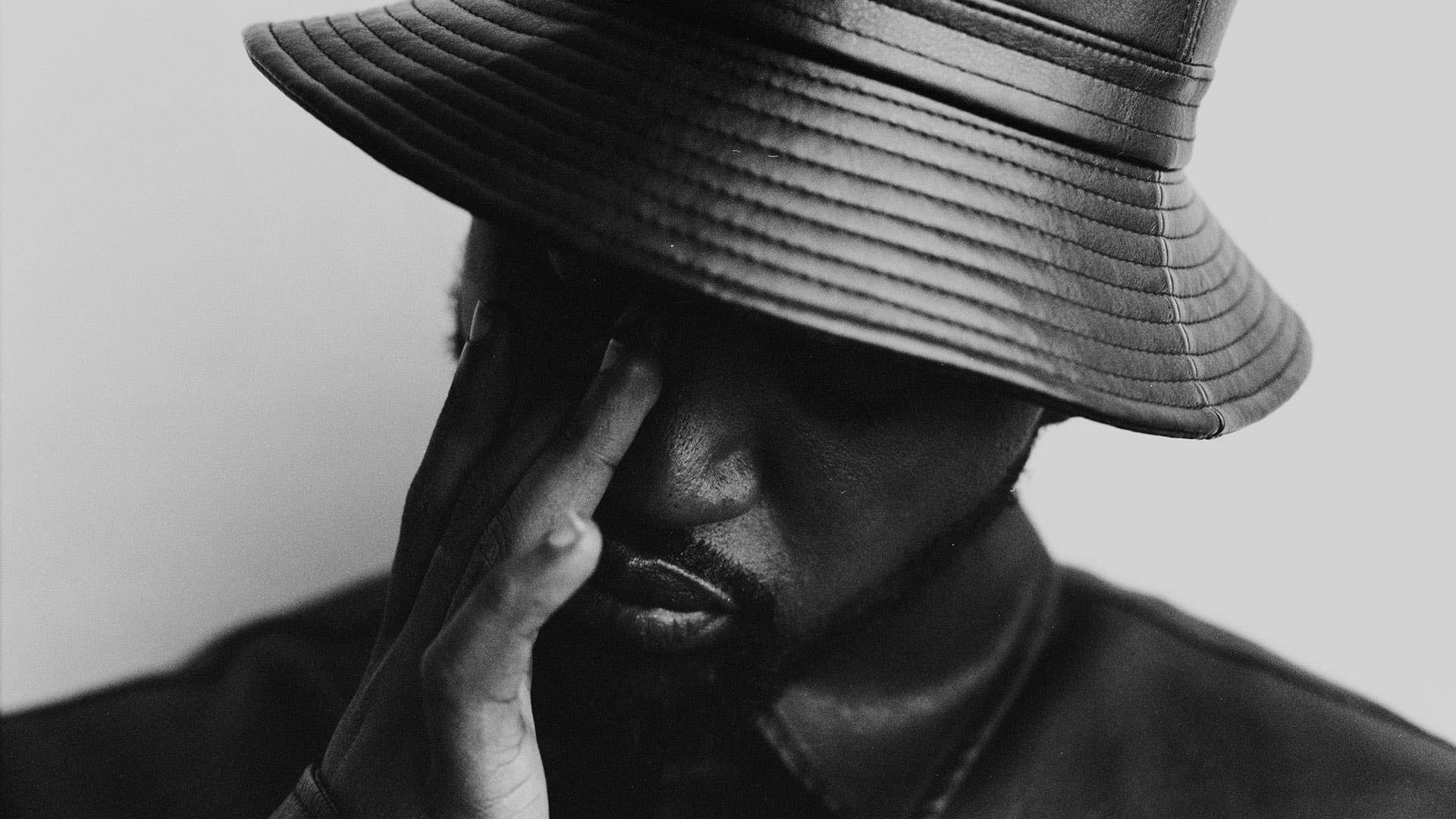
“God loves the weak! God loves the meek!” In a 2020 vlog, we hear Emanuel sample the Sermon on the Mount between bleeped expletives and glasses clinking in the background. “I’m weak and broken! Strong men don’t exist, just righteous men exist!”
“I’ll drink to that, bro,” someone says off-camera. The black-and-white YouTube video chronicled a 2019 trip to the Cayman Islands with friends and collaborators, including his producers John Fellner and Ryan Bakalarczyk, from Emanuel’s hometown of London, Ontario.
Like many R&B singers, Emanuel’s roots can be traced back to church. When I first met him in 2019, he embodied the over-the-top essence of a televangelist. Case in point? He often invoked incongruent parables and once wore a floor-length fur coat on a casual group outing to the movies. Today, the theatrics have been subdued in favour of a more anonymous aesthetic and when we meet via Zoom to discuss his inaugural LP Alt Therapy—released last week via Universal Music Canada and Motown Records—his answers are succinct.
Dating as far as nine years back, there are videos of Emanuel performing covers of songs by the likes of The Weeknd and Frank Ocean. The footage is grainy and the lighting has a seedy yellow cast but his voice is as clear as it needs to be to detect his star potential. His vocal runs are tight and controlled, but breezy and effortless. Like his singing technique, Alt Therapy drifts between urgency and ease with power ballads like “I Need a Doctor” and low-stakes, vibe-driven tracks like “PTH.”
Both Emanuel and the album have evolved significantly since before the pandemic, when we were last in contact. He’s more polished and Alt Therapy, he says, has been completely reworked. “The last time I spoke with you the album was finished—or so we thought. There’s been maybe five more final versions of the album since then,” he explains.
Unsurprisingly, he attributes the delay to COVID. “It afforded us some time to add and remove some records and take the album to where it is right now,” he says. “We took it as a blessing to be able to take our time with the album and to take the setbacks and flip them into adding better detail.”
COVID-19 was indeed a blessing for Emanuel. At the onset of the quarantine, he dropped his debut single “Need You,” a lovesick piano-driven ballad that places his vocals at center stage. Upon its release, Idris Elba created a viral challenge centered on the song, asking his followers to explain what they needed to get through the quar. The single was followed by two EPs (Alt Therapy Session 1: Disillusion and Session 2: Transformation) made up of singles that would later land on the album.
The rollout spanned the entirety of the pandemic—when “Need You” dropped, we were at the base of a deadly and devastating uphill battle, but fourteen months later, Emanuel is releasing his album into a more hopeful world. In our Zoom conversation, he recounts his mother hearing his single while waiting to get her vaccine and the metaphor is evident. The project isn’t without momentary lulls, but its timing is nothing short of divine.
Keep reading for more from our conversation with Emanuel.
How does the Alt Therapy narrative that’s been unfolding over the past two EPs culminate on this album?
With Disillusion we started with a problem and along the way, there were ripples of self-discovery and transformation. I think that’s what the general narrative of the album is: self-discovery, transformation, and healing.
What did you heal from between the first EP and the album?
Within the story that I’m telling and with my life, I’m healing from negative ways I’ve viewed myself and the world, and negative cycles I was in. I’m overcoming a lot of addictions in my life, whether it be addiction to chaos, addiction to toxic relationships, or an addiction to toxic cycles.
“If you look back in history, I would equate times like these to times you’d see some of the greatest artists emerging to give the people what they want.”
One would imagine that being in the music industry would exacerbate those feelings of negativity. How has your experience made those things more positive?
I haven’t had a linear experience in the music industry. It’s still an unfolding story. It’s been amazing to be able to work with such a large machine to accomplish my goals and dreams. It can also feel lonely, though. When you’re dealing with so many people it can be like a game of broken telephone trying to get your message to the world.
What’s something else that you didn’t foresee about bringing this album to fruition?
I didn’t foresee how patient I would have to be with the process and how long it would take. But I also didn’t foresee how fulfilling it would be to walk in something that you planned, cried over, sacrificed for. When you’re actually able to see that through and make legway on it, it’s really rewarding.
Which song on the album was the hardest to complete?
“Hindsight.” From the beginning of its creation I wanted to have a feature on it and it took us a really long time to find one that felt right. We landed on Dylan Sinclair because I’m a fan of his work. We ran into each other and both expressed an interest in collaborating. He’s a brilliant singer and the way he writes is really dope. I’m really proud of the outcome.
Are you a perfectionist?
I’m obsessive, but I’m not a perfectionist.

How has your relationship to stress changed in the past year, when factors beyond your control kept pushing your album back?
[I’ve coped by] leaning on some of the principles and pillars of faith that I have, leaning on the people I love, seeking understanding when I don’t have it, and trying to be still and hold my tongue when I’m frustrated.
Are you excited about where R&B is going?
I hear a lot of nuance in R&B right now. It’s a really exciting time because the listeners want more. If you look back in history, I would equate times like these to times you’d see some of the greatest artists emerging to give the people what they want. To be able to meet that need and be different is the challenge of right now. To write the narrative of R&B yourself and create music that can move people.
Have you had a moment where you’ve seen your music move people IRL?
I don’t go out very much so I haven’t heard my music on the radio yet, but my mom got her vaccination yesterday and she heard my song at the vaccination site. I find it really jarring, but really special that the song is in the world without me. It’s like it has legs and walks around.


